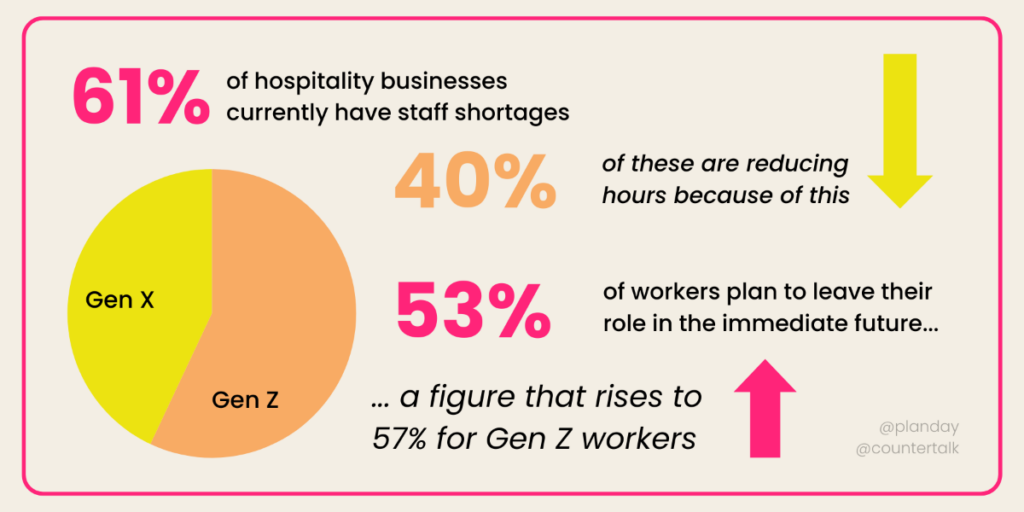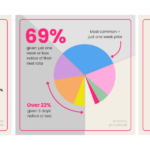UNDERSTANDING GEN Z TO IMPROVE YOUR BUSINESS
We hear it all the time: “Young people just don’t want to put the work in anymore” on one side, and on the other “we just won’t put up with this s**t anymore”. It can seem as though generational differences in hospitality are increasingly polarising our workplaces; the resulting split can be fraught with emotion, and the emotional responses towards either side can increase the division and entrench problems. But what if we took a more fact-based approach, diving into what each side really means – and then giving them what they want?
We have teamed up with Planday, who conducted a survey of research into the habits and work priorities of 2,000 UK shift workers from across the UK, primarily in hospitality, of which 50% were Gen Z employees (aged 16-27). You can read the resulting white paper here. By diving into the results of the survey we aim to use this data to help hospitality leaders gain a true understanding of the key pain points which cause high turnover and low morale, outlining what they could do to keep employees happy, motivated and loyal – with a particular focus on the Gen Z demographic.
Despite young workers aged 16-24 making up around half of the hospitality workforce (and therefore half of the respondents to the survey), we found that many businesses overlook their needs and focus on a minority of older employees who may be in more senior positions. So how do we flip this? Because tailoring our actions to the new generation ensures the longevity of our industry for generations to come.
THE SHORTCUT
- On average, hospitality workers leave their roles after 6 months, with young workers more likely to leave their roles sooner.
- Concerns that require addressing are: better pay, better work/life balance, and better support towards progression.
- Short notice for issuing shift rotas negatively impact workers across all aspects of their lives.
- With a good work/life balance considered the most important factor for 47% of prospective applicants, the ability to plan for life events with sufficient notice must be prioritised.
- Issuing rotas with at least two weeks notice, and utilising online apps, can help mitigate this issue.
- Providing sufficient support for career progression, rather than losing sight of longer-term planning, will encourage younger staff to stay in their roles and helps to build a solid rank of managers-to-come.
- Rather than dismissing Gen Z as ‘soft’, making changes with their needs in mind can positively affect staff retention.
THE DETAIL
PROBLEM: STAFF TURNOVER

Hospitality workers stay in each role for an average of just six months. The financial impact of high staff turnover or staff shortages is high, from lost revenue due to reduced hours to the repeated burden of frequent and expensive recruitment and training. Add to that the impacts of lower sales or reduced customer satisfaction through inexperienced staff, and you could be looking at costs which can break a business. And this isn’t likely to change on its own – in fact, the statistics show that Gen Z are more likely to leave their role sooner, so unless we make changes specifically catered to Gen Z job satisfaction, staff turnover is likely to get worse.
SOLUTION:
- Better pay (53%), better work/life balance (29%) and better managerial support on progression (25%) are the top factors that would keep shift workers from leaving their current role. Whilst the statistics around pay will come as little surprise, it’s also one of the hardest to address in the current environment, with many businesses also struggling to make ends meet.
- It’s crucial to prioritise understanding the various interconnected elements that influence long-term job satisfaction. This involves adapting work practices to accommodate work-life balance and career advancement, while also recognizing alternative strategies to meet evolving needs. This includes actively listening to the diverse needs across different generations.
PROBLEM: NEGATIVE WORK/LIFE BALANCE
The results regarding shift patterns and rotas were extremely stark, detailing just how many employees are given such short notice of work that it adversely affects their family, friendships, mental health and even their ability to cater for basic needs such as doctor appointments. Businesses that fail to see the rising importance of this demand will start to lose out to those that do – a good work/life balance is the most important factor for 47% of employees when looking for a new job, meaning they simply won’t consider any hospitality business that doesn’t offer this. However this is still not being reflected in the behaviours of many employers:

SOLUTION:
- Fixing the ability to plan in advance would immediately move more positively towards a culture of respecting and honouring employees’ work/life balance, with 67% of employees stating that having more notice in this regard would significantly improve their life – and a quarter of respondents saying that clearer communication on rotas and shifts would be enough to keep them in their current position.
- The first thing companies need to do is to plan and issue their rotas at least 2 weeks ahead, ideally more, which means giving those in charge of the rotas the time to do so, and also having clear employee policies in place about when and how to place shift requests and holidays. When managers try to pull requests from numerous channels – emails, in person, paper forms etc, it can feel impossible and excessively time consuming – so have one clear channel for requests, with clear deadlines.
- Paper rotas are still the most common way to manage shifts, which are then conveyed through messaging platforms such as WhatsApp. This means – especially in larger companies – that communication of shifts and changes become extremely complicated, which can lead to a feeling of insecurity from both parties and a consequent breakdown of trust. As the Gen Z becomes an increasingly crucial lynchpin of the workforce, companies should consider leaning in to their native environment – phone, online, tech – centralising requests and rotas via apps to ensure that all communication is centralised.
PROBLEM: LACK OF CAREER PROGRESSION
Only 54% of respondents have a line manager who gives them regular appraisals, and 71% of the people who feel that they lack appropriate guidance to reach the next rung on their career ladder plan to leave their role in the immediate future. Gen Z were the segment of respondents who felt this the sharpest, with well over a third stating that it’s a strong priority for them. In the current climate of economic difficulty and staff shortages, business owners and managers can be so consumed with the nitty gritty of the day-to-day that they can lose sight of longer-term planning with their employees, but this is contributing to higher turnover which will exacerbate their problems.
SOLUTION:
- Ensure that managers have sufficient time to focus on big picture planning, allowing them to build individualised progression plans for each employee. This could mean streamlining their working practice in other areas, such as rota planning.
- Great managers will train more great managers! 31% of hospitality employees felt that developing their own management capability was one of the most important skills to develop to progress their career, so it is vital the industry does more to support current managers, especially as those younger employees come through the ranks. Formal training is available, and there are also numerous resources which you can access via Countertalk and Planday.
PROBLEM: OUTDATED ATTITUDES
Our industry and our workforce is changing, and we need to change with it to ensure longevity and success. We recently published a feature on positive alternatives to common modes of thought which serve to negatively stereotype and impact our industry. It’s easy to dismiss the needs of Gen Z as ‘soft’, but we should consider how making changes with them in mind could positively impact all of us – with just 49% of Gen Z feeling valued in their role, and far fewer feeling listened to at work, how can we work on our culture to ensure that everyone in our business feels appreciated and heard?
SOLUTION:
- 85% of respondents have suffered with mental health problems in the past 12 months, but only 24% have access to support in the workplace. Every business should implement their own mental health policies and plans, but they should also listen to what is impacting that in the first place – for example irregular shift patterns have kept 52% from taking up hobbies and exercise, which significantly affects their mental health, and over half of respondents also report that the inability to forward plan causes them stress and anxiety. Advance rotas may seem like a small thing, but it may have a big impact.
- Sometimes, the ways in which we think we are being progressive – for example, a generous benefits package – can fall flat whilst still costing employers a lot of money (only 49% of Gen Z are happy with their benefits). This can cause resentment on both sides. The key once again is listening to employees and tweaking according to feedback. For example, gym memberships might be costly to the employer and a source of annoyance to the employee as they can never use it – even though it was initially cited as a desired package. The solution might not be dropping it altogether, but instead ensuring that the work/life balance is correct (see above) so that the benefits can actually be enjoyed.
THE TAKEAWAY
High staff turnover and staff shortages are seriously affecting businesses and revenue, and are directly related to a range of issues impacting job satisfaction – Planday’s white paper report shows that those numbers are increasingly stark amongst the younger workforce. Addressing Gen Z’s concerns, in addition to looking after the minority of older employees in more senior positions, is part and parcel to retaining staff. Solutions like issuing staff rotas with at least two weeks notice (if not more!), shifting away from paper rotas to using streamlined apps built for easier communication, providing appropriate support for career progression, and leaving behind certain outdated attitudes to adapt to a more modern workforce, can help shift that data for the better.
